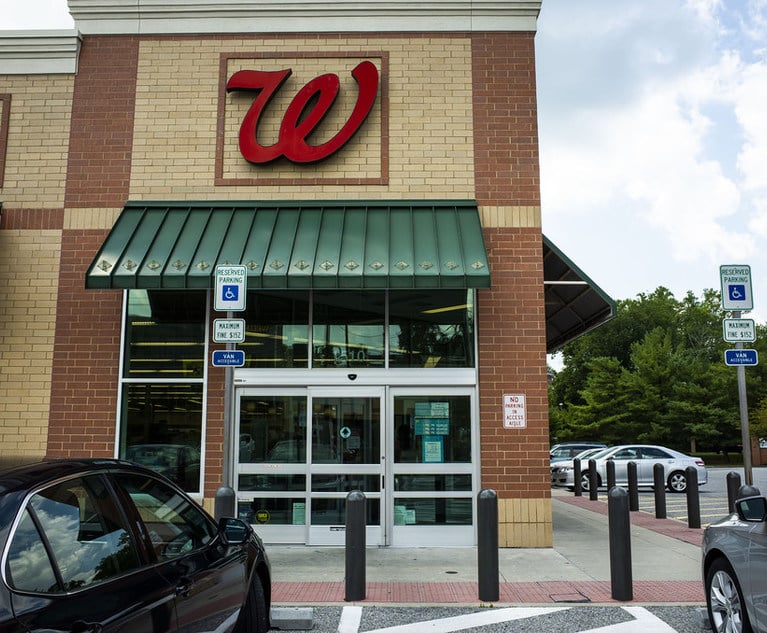 Bigstock
BigstockRights of First Refusal and First Offer: Assessing a Tenant's Rights
Many commercial tenants are able to negotiate for a right of first refusal or first offer to purchase the property they lease. What happens to that right if the lease-term expires and the tenant stays on month-to-month?
May 17, 2019 at 11:30 AM
9 minute read
Many commercial tenants, depending upon market conditions and their overall leverage in a transaction, are able to negotiate for a right of first refusal or first offer to purchase the property they lease. A right of first refusal typically provides the tenant a right to match a third-party offer to buy the property, whereas a right of first offer provides the tenant with the first opportunity to buy the property on material economic terms that are proposed by the seller. From the perspective of both landlord and tenant, any such provision should be carefully drafted in the lease so that the rights and obligations of the parties are unambiguous, and there are no misunderstandings or disagreements as to how and when the clause is triggered.
|What Are Tenants' Rights? Do They Still Exist?
Often the specific details of the purchase right are contained in the original lease. A memorandum of lease, which puts third parties on notice as to the existence of such right, is often recorded in the land records. While the terms may originally seem clear to both parties, what transpires over the course of time can often muddy the waters. For instance, the lease could be amended with or without a clause that provides that all terms of the original lease, as amended, remain in full force and effect. Another situation may involve the written lease term expiring and the tenant becoming a “month-to-month” tenant without any writing addressing whether the purchase right was intended to extend into the month-to-month tenancy. In situations such as these where the result is not clear, applicable case law in a given state should be researched to fill in the gaps and help interpret such ambiguous provisions.
This article will address New York and New Jersey case law on the subject.
|New York Cases
In New York, there is some guidance on the matter.
In Gulf Oil Corp. v. Buram Realty Co., 11 N.Y.2d 223 (1962), the Court of Appeals ruled that a purchase option contained in a lease, which could be exercised “at any time during the term,” did not become part of 22 successive extension agreements executed after the initial lease term expired. The court reasoned that the extension agreements did not preserve the tenant's purchase option as they were new agreements separate and apart from the renewal options contained in the original lease, and there was nothing definitively stated in the extension agreements that manifested a clear intention to incorporate the purchase option.
In Galapo v. Feinberg, 266 A.D.2d 150 (1st Dept. 1999), the court examined whether a tenant's purchase option, which was contained in the original lease and conditioned on tenant not being in default under the lease, carried over into a month-to-month tenancy. In deciding that the purchase option was no longer effective, the court stated that “an option to purchase contained in a lease is, unless expressly reaffirmed in a subsequent lease or extension thereof, only valid during the term of the original lease … which, in this case, had expired.” The court so concluded even though the landlord's attorney mistakenly sent a letter to the tenant, after the right of first refusal had expired, reminding tenant of the right of first refusal contained in the original lease. The fact that the tenant had been paying less rent than prescribed in the lease also had the effect of terminating the option, because the tenant had not honored the terms of the lease, although the landlord never declared the tenant in default and did not reject the reduced rent that the tenant was unilaterally paying.
In Coinmach Corp. v. Fordham Hill Owners Corp., 3 A.D.3d 312 (1st Dept. 2004), the tenant sought to enforce a right of first refusal relating to the installation and operation of laundry machines while it was a month-to-month tenant. The original lease provided that “at the expiration of this Lease or any renewal, Lessee shall have the right of first refusal to meet any bona fide bid to lease the laundry room(s) and/or provide coin-metered laundry equipment services to the Premises.” However, the original lease term expired, and the tenant became a month-to-month tenant. When the tenant sought to enforce its rights, the court held that the right of first refusal was not valid during the term of the month-to-month tenancy because there was no written agreement extending that right into the month-to-month tenancy. The court ruled that “the right of first refusal is an exception to the general rule that the covenants of the lease are extended into a month-to-month tenancy” and such right “must be expressly reaffirmed” in order for it to survive expiration of the written lease term.
The court also reached a similar result in Pepe v. Stock, 24 A.D.3d 527 (2nd Dept. 2005), finding that the tenant's right of first refusal was no longer enforceable because the lease term had expired without being extended.
|New Jersey Cases
New Jersey case law is similar to that of New York in holding that rights of first refusal and first offer contained in a lease do not carry over beyond the written lease term, even though the tenant may still be in possession of the premises.
In Andreula v. Slovak Gymnastic Union Etc., 140 N.J. Eq. 171 (Ch. 1947), the lease provided the tenant with “the first option to purchase” the premises. After the written lease term expired, the tenant remained in possession as a month-to-month tenant and continued to pay rent. Subsequently, the tenant learned that the landlord was under contract to sell the premises to a third party, and then sued the landlord to enforce his purchase rights under the lease. The court found the tenant was a holdover month-to-month tenant, and “an option to purchase contained in a written lease cannot be exercised after the expiration of the written lease by a tenant holding over since it is a collateral contract, independent of the lease.” In other words, the option to purchase had expired with the expiration of the written lease term, and the fact that the tenant remained in the premises as a month-to-month tenant was irrelevant because the option was “not to be regarded as a provision incident to the relation of landlord and tenant.”
A similar result was reached by the Appellate Division of the Superior Court of New Jersey in Patel v. 323 Cent. Ave. Corp., 2008 N.J. Super. Unpub. Lexis 2444, where a physician sued to enforce the right to purchase an office building where he was leasing space. The court found that the tenant's purchase rights expired at the end of the written lease term, and the tenant, as a holdover tenant, could not exercise the purchase right after the written lease term had expired. Thus, the landlord's subsequent sale of the property to a third party, without giving tenant the first opportunity to purchase, did not violate the terms of the lease.
The Appellate Division ruled similarly in Fedderly v. Skoda, 2009 N.J. Super. Unpub. Lexis 1827, where an office lease included a right of first refusal to lease additional space in the building. The lease term was extended via a series of one-year extensions, after which the tenant became a month-to-month tenant and then sought to enforce the right of first refusal contained in the original lease. The Appellate Division, relying on Andreula, ruled that the tenant was a holdover tenant, and the right of first refusal previously expired at the expiration of the written lease term. The court reasoned that a right of first refusal does not survive the written lease term because it is a “collateral agreement, independent of the lease,” and the tenant could therefore only exercise it during the written lease term.
These cases are contrasted with Balsham v. Koffler, 8 N.J. Super. 48 (App. Div. 1950), which involved a lease with a one-year term that expressly provided for renewal on a month-to-month basis thereafter. The court in Balsham ruled that the tenant's purchase option was still valid during the month-to-month portion of the lease because the additional month-to-month term was provided for in the original lease and was therefore not a new demise, but a continuation of the old one. In other words, at the time the option was exercised, the tenant was not a holdover tenant, but a tenant holding under the lease.
|Conclusion
Based upon these cases, where a written lease term is expiring and the tenant is transitioning to a month-to-month tenancy, the tenant must enter into some writing with its landlord to confirm that its purchase right under the original lease remains effective. In New York, absent such written confirmation, the tenant's purchase rights (in whatever form) will most likely be found to have expired. A similar outcome is likely in New Jersey, unless the month-to-month lease term was expressly provided for in the original lease.
Naturally, to limit potential conflicts and avoid litigation, which may obstruct or delay a sale in the future, lease clauses of this type must be carefully drafted at the outset, so as to fill in the pertinent details and leave less to the interpretation of a party seeking to enforce a purchase right it believes is still effective or has been triggered by certain acts of the owner.
Mark Levenson is the co-chair of the Real Estate Department of Sills Cummis & Gross P.C. and Jeffrey Meltzer is a Member in the firm's Real Estate Department. The views and opinions expressed in this article are those of the authors and do not necessarily reflect those of Sills Cummis & Gross P.C.
This content has been archived. It is available through our partners, LexisNexis® and Bloomberg Law.
To view this content, please continue to their sites.
Not a Lexis Subscriber?
Subscribe Now
Not a Bloomberg Law Subscriber?
Subscribe Now
NOT FOR REPRINT
© 2024 ALM Global, LLC, All Rights Reserved. Request academic re-use from www.copyright.com. All other uses, submit a request to [email protected]. For more information visit Asset & Logo Licensing.
You Might Like
View All
Appellate Div. Follows Fed Reasoning on Recusal for Legislator-Turned-Judge
4 minute read
Chiesa Shahinian Bolsters Corporate Practice With 5 From Newark Boutique
5 minute read
'A Mockery' of Deposition Rules: Walgreens Wins Sanctions Dispute Over Corporate Witness Allegedly Unfamiliar With Company
Trending Stories
Who Got The Work
Michael G. Bongiorno, Andrew Scott Dulberg and Elizabeth E. Driscoll from Wilmer Cutler Pickering Hale and Dorr have stepped in to represent Symbotic Inc., an A.I.-enabled technology platform that focuses on increasing supply chain efficiency, and other defendants in a pending shareholder derivative lawsuit. The case, filed Oct. 2 in Massachusetts District Court by the Brown Law Firm on behalf of Stephen Austen, accuses certain officers and directors of misleading investors in regard to Symbotic's potential for margin growth by failing to disclose that the company was not equipped to timely deploy its systems or manage expenses through project delays. The case, assigned to U.S. District Judge Nathaniel M. Gorton, is 1:24-cv-12522, Austen v. Cohen et al.
Who Got The Work
Edmund Polubinski and Marie Killmond of Davis Polk & Wardwell have entered appearances for data platform software development company MongoDB and other defendants in a pending shareholder derivative lawsuit. The action, filed Oct. 7 in New York Southern District Court by the Brown Law Firm, accuses the company's directors and/or officers of falsely expressing confidence in the company’s restructuring of its sales incentive plan and downplaying the severity of decreases in its upfront commitments. The case is 1:24-cv-07594, Roy v. Ittycheria et al.
Who Got The Work
Amy O. Bruchs and Kurt F. Ellison of Michael Best & Friedrich have entered appearances for Epic Systems Corp. in a pending employment discrimination lawsuit. The suit was filed Sept. 7 in Wisconsin Western District Court by Levine Eisberner LLC and Siri & Glimstad on behalf of a project manager who claims that he was wrongfully terminated after applying for a religious exemption to the defendant's COVID-19 vaccine mandate. The case, assigned to U.S. Magistrate Judge Anita Marie Boor, is 3:24-cv-00630, Secker, Nathan v. Epic Systems Corporation.
Who Got The Work
David X. Sullivan, Thomas J. Finn and Gregory A. Hall from McCarter & English have entered appearances for Sunrun Installation Services in a pending civil rights lawsuit. The complaint was filed Sept. 4 in Connecticut District Court by attorney Robert M. Berke on behalf of former employee George Edward Steins, who was arrested and charged with employing an unregistered home improvement salesperson. The complaint alleges that had Sunrun informed the Connecticut Department of Consumer Protection that the plaintiff's employment had ended in 2017 and that he no longer held Sunrun's home improvement contractor license, he would not have been hit with charges, which were dismissed in May 2024. The case, assigned to U.S. District Judge Jeffrey A. Meyer, is 3:24-cv-01423, Steins v. Sunrun, Inc. et al.
Who Got The Work
Greenberg Traurig shareholder Joshua L. Raskin has entered an appearance for boohoo.com UK Ltd. in a pending patent infringement lawsuit. The suit, filed Sept. 3 in Texas Eastern District Court by Rozier Hardt McDonough on behalf of Alto Dynamics, asserts five patents related to an online shopping platform. The case, assigned to U.S. District Judge Rodney Gilstrap, is 2:24-cv-00719, Alto Dynamics, LLC v. boohoo.com UK Limited.
Featured Firms
Law Offices of Gary Martin Hays & Associates, P.C.
(470) 294-1674
Law Offices of Mark E. Salomone
(857) 444-6468
Smith & Hassler
(713) 739-1250







